
19 minute read
War Cry World
Footballer finds goal of peace through Bible
FOOTBALLER Bukayo Saka, who has been chosen as one of Time magazine’s Next Generation leaders, says that reading the Bible provides peace.
A feature in the publication explained how the 19-year-old coped with the racist backlash and negativity he received after missing one of England’s penalties in the Euro 2020 final.
Saka told the magazine: ‘I knew instantly the kind of hate that I was about to receive.’ However, the article noted, he had responded with positivity.
Time reported that he attributes his hard work and professionalism to his upbringing in a Nigerian immigrant family and being raised a Christian. He still reads his Bible every night, which he says provides ‘peace and happiness’.
Sculpture of Jesus to travel the world
A ‘HYPER-REALISTIC’ sculpture of Jesus has been unveiled in Spain, reports The Sun.
The lifesize model, ‘made of latex, silicon and real human hair’, was created using data collected from the Shroud of Turin, a relic which is said by some to be the burial cloth of Jesus after his crucifixion and bears the image of the body of a man.
The Mystery Man features all the wounds said to have been inflicted on Jesus, including cuts where a crown of thorns was forced on his head, as well as a spear wound on his side and scratches from when he was whipped.
It is on display in Salamanca Cathedral and can be viewed until December, after which it will travel the world.
The Bishop of Salamanca, Jose Luis Retana, said the body of the man in the shroud can represent ‘the concretion of God’s love that becomes flesh in Jesus Christ who dies like a malefactor with a terrible sacrifice for our salvation. There is no greater love in the world.’
Salvation Army gives energy boost
THE Salvation Army in Southport is providing energy top-ups to vulnerable members of the community to help them deal with cost of living pressures over the winter period. The church supported 196 people last year but is expecting even greater demand for its energy top-up support. It saw a 57 per cent rise in referrals in September 2022 compared with January and February 2022 combined. Captain Alison Hutchings, leader of The Salvation Army in Southport, said: ‘We’re all anticipating a hard winter and sadly everyone’s money and our funds simply aren’t going far enough. People are in terrible situations, making unimaginable decisions such as whether they choose to heat or eat, and we feel this is going to be a reoccurring story. ‘Here at The Salvation Army we put our faith into action by providing this service and being a genuine part of the community, helping people in times of need.’ Faiths on the march for climate action The Southport church is working in partnership with Citizens Advice, the council, a food bank, health visitors and CHRISTIANS joined a march in Machakos, Kenya, calling for Cop27 to deliver social services. universal access to clean, affordable energy for Africa. During the Kick Fossil Fuels Out of Africa march, which drew support from other faith groups and Kenyan students, protesters drew attention to the arrest of Ugandan students who campaigned against the creation of the East Africa Do you have a Crude Oil Pipeline. Meryne Warah, of march organisers GreenFaith, a multifaith climate justice story to share? movement, said: ‘Fossil fuel projects displace communities, destroy local livelihoods, spew deadly pollution and enrich corrupt elites. Women-owned, community-led clean energy solutions deliver far more equitable outcomes. a warcry@salvationarmy.org.uk Africa’s leaders should stop salivating over oil and gas and become serious about our continent’s clean energy future.’ @TheWarCryUK The Cop27 climate change conference begins in Sharm el-Sheikh, Egypt, tomorrow (Sunday 6 November). TheWarCryUK B
Singer goes beyond the call of beauty
Trained at a prestigious music college, NATASHA HEMMINGS sang on the way to being crowned Miss England and has toured with acts including Ronan Keating. Due to release a new album early in the new year, she talks about misconceptions of the Miss England contest, being misjudged and the subject matter that influences her songwriting
Interview by Philip Halcrow
MUSIC has been a theme throughout the life of
Natasha Hemmings – but there have been some striking variations in the way her career has developed. She has studied at the Royal Northern College of Music (RNCM). She has toured with Aled Jones, Russell Watson and Ronan Keating. And she made music on her way to being crowned Miss England 2015.
Before and after Miss England, Natasha was learning about music at the RNCM. She graduated from there with a pop degree in 2019, but her introduction to it came years earlier.
‘When I was growing up I just loved singing,’ she says, remembering her childhood in the market town of Nantwich in Cheshire. ‘It didn’t matter what style it was, as long as it was music, and I began taking piano and singing lessons. I always knew I wanted to be a singer.
‘My mum and I looked up information on how Beyoncé made it in the music industry. I saw that she had joined a choir, so I joined my local choir, which was actually a professional classical choir. I was 12 years old and the closest person to me was 38. So I was a bit of an oddball in the choir, but it launched a lot for me.
‘The conductor took me under

Turn to page 6 f
Natasha recently supported Ronan Keating on his UK tour

his wing and gave me lessons. He also knew about the Royal Northern College of Music, and he said that I ought to have professional lessons and be taught by a woman with the same kind of soprano voice as me. So I set out to audition there at the age of 14. I got in and was among all these other talented musicians under the age of 18. I was there for four years until it was time to go to university.’
While singing the classical repertoire, Natasha was already writing her own music.
She says: ‘I didn’t know whether I was going to go down the classical opera route or the recorded pop music route. When I finished Junior RNCM I was too young to continue with classical music at the conservatoire, because they don’t not something I knew much about. I researched it, however, and it was eye-opening. When I turned up for it, I was looking at girls of 17 up to 25 raising hundreds of thousands of pounds for charity, doing things for their community, talking about causes that mattered to them and what they were going to do with their lives. They had huge ambitions. The then Miss England was a doctor from Cambridge University, who was super-smart and is now working at the World Health Organisation.
‘It wasn’t what many people remember it to be. It isn’t about being in a swimming
take anyone younger than 24 – your voice has to mature.’
So, Natasha put a pause on her musical education and started an English literature degree at university. However, she was unable to settle and didn’t make Miss England isn’t friends. Sensing Natasha’s about being in a unhappiness, her mother entered her for Miss England. swimming costume
‘I think she saw it as a way for me to meet people my own age who were coming together to be part of something,’ says Natasha.
‘I would never have entered myself into a beauty competition. It was
Natasha says her music draws on her ‘thoughts, feelings and memories’


Being crowned Miss England 2015 by previous winner Carina Tyrrell
costume – you didn’t have to do that. It isn’t about being judged on your outer beauty. You win points for how much money you raise and what you do in your community. There is a sport round to promote health and fitness and a talent competition.’
Natasha used her music-making in the competition.
‘The talent round gave me an opportunity to sing, and I hope that contributed to me winning,’ she says. ‘After Miss England I went round the world and would sing at charity functions, raising money. I also sang in China for the Miss World event.’
Natasha’s Miss England experience provided inspiration for one of her songs, released earlier this year.
‘I wrote “Invisible” about the way people prejudge others and don’t care to know the real person. People think I was a beauty queen who one day decided to be a singer. It’s infuriating, because I have worked so hard to be a musician.
‘The song is also about social media and the way in which people put a perfect version of themselves online. We’re all comparing ourselves to it, which causes a lot of mental health issues, because our lives do not live up to these unattainable standards. We don’t look like these girls on social media. We don’t have that car. Our holidays aren’t like that. It makes people feel that they’re not enough.
‘“Invisible” asks the question: What if we were invisible for a day and didn’t care about what anyone thought about us? It would be so liberating. We could just love ourselves for who we are.’
Natasha says that she often draws on her experiences when writing. Among the ‘thoughts, feelings and memories’ that make their way into her classically influenced pop songs are those connected with her faith. She gives the example of her song ‘Only Love’, whose lyrics speak of reassurance in tough times and which she describes as being about God.
Natasha says that she began to get to know God while going through a difficult time in her sixth form, when she found herself on the receiving end of ‘kids being kids’, who cut her out of their circles, leaving her feeling alone.
‘One day at school it all got too much,’ she recalls. ‘I walked down to the church where we had assemblies sometimes. Somebody saw me and came to me. I don’t remember saying anything, but she could see that I was heartbroken. So she sat me down and prayed over me.
‘I’ve never forgotten it. It opened up my desire to know more about Christianity. I then went on a journey of realising that
I could have a relationship with God. I had been raised to believe that there was a God, but we didn’t read the Bible and we didn’t pray, so the idea that Jesus was somebody I could speak to every day was new to me. ‘I researched everything I could, talking to people, reading and listening to Christian radio stations. When I did Somebody saw I my English degree I took theology as a subsidiary module.’ was heartbroken She describes faith as ‘a blessing and a challenge’. and prayed over me ‘People who don’t believe often say that faith is a crutch, but I don’t feel it’s an easy thing – it’s not easy to accept that there’s a plan for your life and that it may not be the one you have for yourself. There are moments when I don’t know whether God is asking me to do something or whether the gut feeling I have is just something that I have made up.’ She has moments of doubt but recalls a ‘crazy experience’ when she was very upset soon after coming to faith and felt the ‘warm glow’ of a presence with her. ‘I knew it was Jesus,’ she says. As she takes further steps in the music industry, she envisages being further influenced by her faith. ‘Faith is something that people may shy away from,’ she says. ‘They see it as polarising. But to me it’s an amazing, peaceful thing. So I want to talk about it and encourage people to explore it.’
JOHN GIBSON recalls the pain he felt when his son Cameron took his own life and reveals how he has set up a charity to support other people affected by the same kind of loss
Interview by Emily Bright
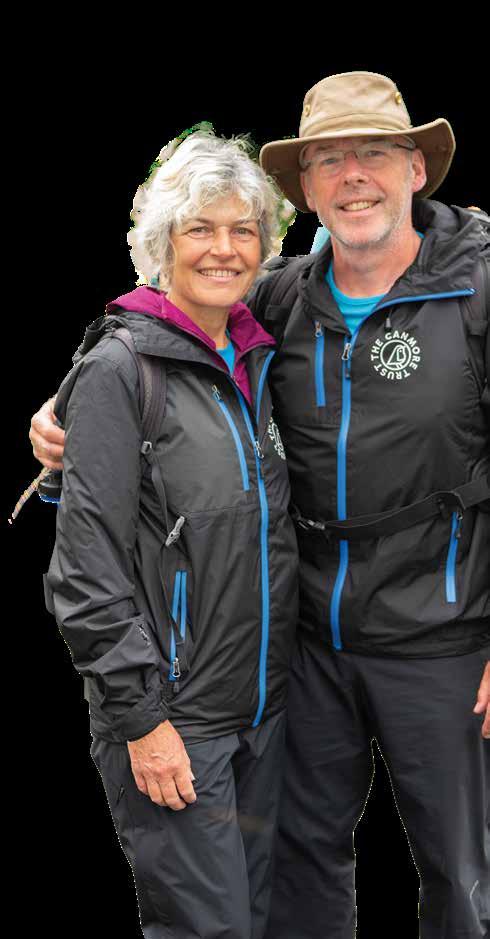
‘CAMERON had a fantastic smile that lit up a room,’ remembers his father, John Gibson. ‘He was
generous with his time and helpful towards others. He was a sportsman – he cycled a lot, kayaked, loved hillclimbing and went road biking, but his main sport was skiing.
‘He was also gifted at DIY, and would spend hours making things for people. His final project was making a surfboard for himself. He loved sport and loved people. But he enjoyed time on his own as well. He would quite happily go off and do a day’s hike on his own. Most people would remember him for his amazing smile.’
But on Sunday 20 October 2019 John received the news that his 24-year-old son had taken his own life. There was no warning beforehand that he was even considering doing so, John recalls over Zoom from his home near Stirling.
‘I had last spoken with Cameron on the Saturday, and he seemed to be in a good place,’ says John. ‘He left his house as if he’d been off to buy a pint of milk. There was no indication of any forward planning around suicide. Cameron went shopping, his fridge and freezer were both full. He had done a load of washing and it was drying upstairs in the house. He was a vet who loved cooking and baking, and he had made traybakes for the practice staff.
‘He had gone to a ceramics pottery class in the afternoon, made his friend dinner in the evening and then gone off for drinks. Cameron climbed into his work van at
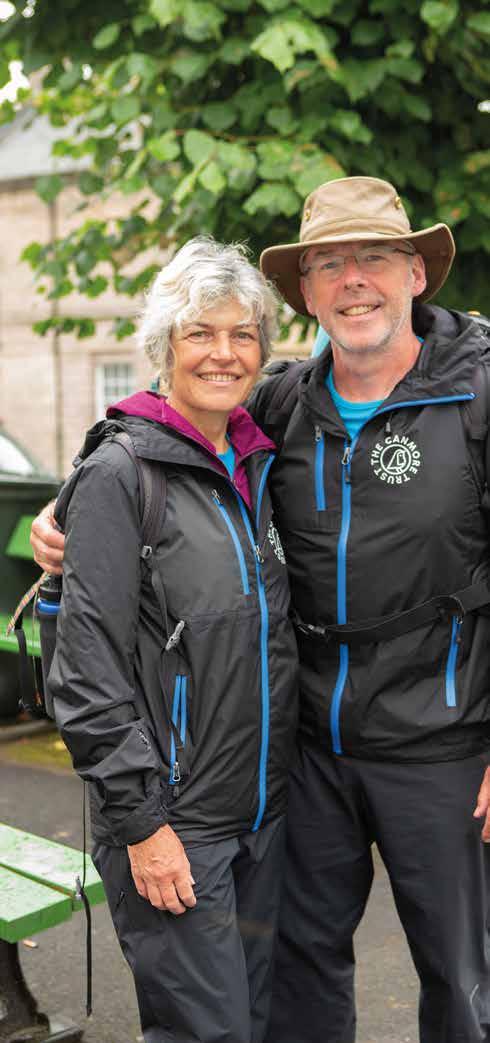
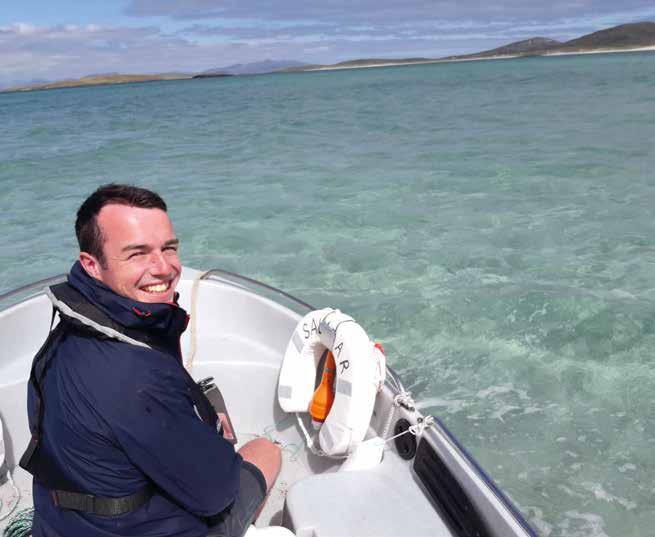
Cameron Gibson
12.30am, and at 1.30am, he was found speak into these circumstances, because dead.’ this is desperate.” And there was silence.
The next morning John and his wife, ‘I remember going further down the Isobel, were told. stairwell, stopping again in the darkness
‘The police came to the door at and saying: “God, this isn’t good enough. 7.45am, and this strange journey of You’re going to have to speak, because grief started. The first thing that strikes you’re a Father who’s lost a Son and I’m you is the thought that it can’t be true. now also a father who’s lost a son.” There It is somebody else’s son. was silence. You have to go through phases of guilt, shame and God was very ‘I walked on again, feeling really broken, and just said: everything else that comes along with suicide.’ close in those “Lord, you need to speak.” ‘I asked him: “Did you need
John tried to take comfort early hours a vet in Heaven? Is that why in his Christian faith. you took Cameron?” I felt God
He says: ‘It has not been respond in a fatherly way: an easy journey. Despite my faith, I really “No John, there’s no death or disease in struggled. But God was very close in Heaven, so why would I need a vet? No, I those early hours, weeks and months needed a shepherd. And Cameron is such after Cameron died.’ a good shepherd.” Those were pivotal
Nevertheless, John recalls how moments, because God was speaking he grappled with his faith amid his into the intimacy of his understanding overwhelming grief. of us as a family. Although he’d always
‘Less than 48 hours after Cameron had wanted to be a vet, Cameron really loved died I was wide awake about four o’clock sheep and often had said that all he one morning, feeling broken inside. I wanted to do was to be a shepherd. Not was silently screaming. I decided to go many people knew that. He was a very downstairs, and I stopped halfway down and said: “God, you’re going to have to Turn to page 10 f
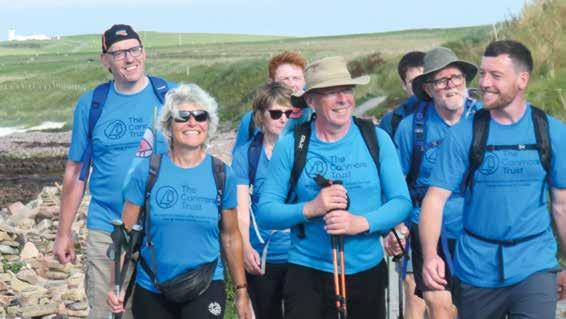
good shepherd and spent spring seasons lambing and doing caesareans on sheep. He loved newborn lambs.
‘To hear God speak with such beauty and intimacy made me feel as if he was holding me as a son, saying: “I know you don’t understand this, but are you prepared to trust me?” I said: “Lord, who can I go to but you?” It wasn’t that everything was fixed in that moment – I had months of grief to work through – but it felt as if God, in those early months, was very near.’
However, John continued to wonder why God hadn’t intervened while Cameron was still alive.
‘He didn’t stop the suicide,’ John says. ‘When I walk into eternity maybe I’ll understand why he didn’t. I don’t know. But I picked that theme up eight months later when I was suicidal myself and I felt at that time that God had left the building.
‘I missed Cameron so much and was overwhelmed with the loss of our son. All our children are an equally big part of our lives, but when one leaves voluntarily – that’s what it felt like – that is very painful. My grief journey became darker and darker, to the point where I made an attempt on my own life.’
When John survived, he sought out mental health support.
‘I decided to see a psychiatrist, who understood me immediately,’ he says. ‘She encouraged me towards Survivors of Bereavement by Suicide. She said: “You need to find empathy by meeting people who are on the same journey and are exactly where you are.” As a result, I went along to a SoBS meeting.
‘Something remarkable happened that night as I walked into the room. There was no judgement, no fear, just a group of people who absolutely understood where I was at and what I needed. I realised that things can get better, but I needed that support to walk me through that darkness.
‘Out of that, I decided to become a SoBS facilitator for the Edinburgh group, which meets online and face to face. I now talk openly about my own mental health issues. We whose children died but who continued have to do that. Men in particular are to trust in God. not good at talking spontaneously about ‘The Book of Job makes it clear that the mental health issues. That narrative has to Lord gives, and the Lord takes away,’ says change.’ John. ‘These are difficult verses to wrestle
John’s attitude towards faith evolved in with. But as Christians, we have to say: the months that followed. “God is God.” And either he’s sovereign
‘I felt as if I’d lost much of my faith,’ he and we have to trust him in the good and says. ‘But one morning I was walking in the bad, or he’s not God at all.’ the woods near where As well as taking we live and it was as if God tapped me on my I realised that things strength from his faith, John began walking in shoulder. I felt him say to me: “You know I’m can get better the great outdoors as an outlet for his grief. still here for you.” As ‘I started walking a result, I embraced faith with a different with friends. We decided to walk from view of life. Now I see God as a friend of Land’s End to John O’Groats to open the weak, who is among us.’ up conversation and connect families
John’s experiences have also made him affected by suicide, using the hashtag see the Bible in a new light, particularly #onemanwalkingamilliontalking. When passages about the man called Job, planning for the trek, we decided to start
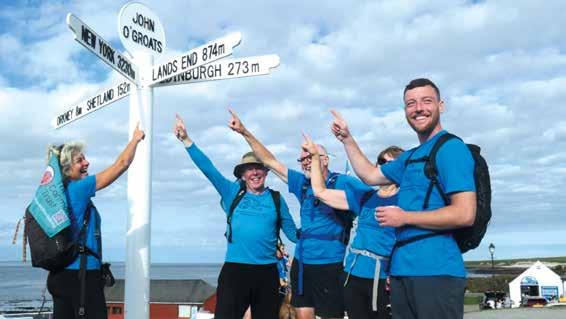
John and his team of walkers arrive at John O’Groats after a 1,200-mile fundraising walk
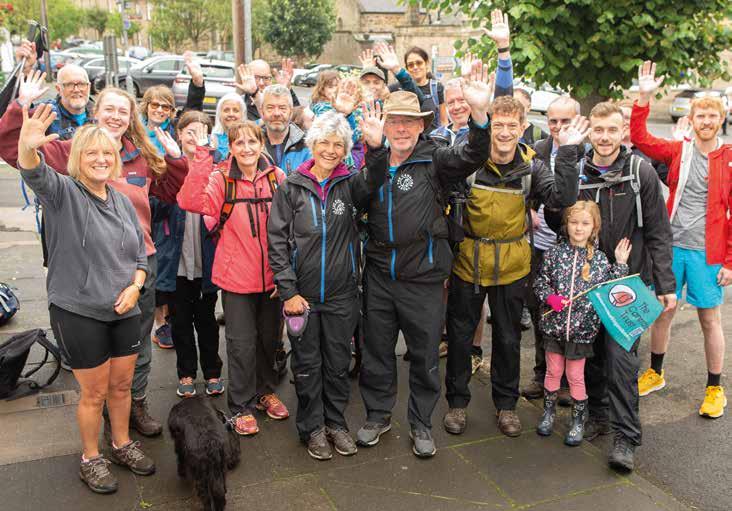
The team enjoyed huge support along their walking route
a charity in Cameron’s name, which is where the Canmore Trust came from, Canmore being an anagram of Cameron.’
John outlines the aims of the Canmore Trust, which was registered as a charity in January this year.
‘We want to help people who have been affected by suicide, and to offer safe accommodation, where a counsellor or supporter would be able to work with families in those very early days following a suicide.
‘But we also want to be engaged in suicide prevention, and our biggest aim is to work in schools, colleges, universities and workplaces to talk about suicide prevention planning. A recent Scottish study has shown that one in five people under the age of 35 may experience suicidal thoughts. We need to reach them through education long before they get to that point.
‘When you talk about suicide openly in schools, alongside suicide safety planning, long-term follow-up studies demonstrate clearly that there are fewer deaths and attempted suicides in the communities served by such schools.’
In time, John’s planned hike took on a greater significance.
‘As the Canmore Trust idea developed, I realised that we could fundraise for it as we walked the 1,200 miles from Land’s End to John O’Groats.
‘We had flags with the Canmore Trust logo and #onemanwalkingamilliontalking on them, and these flags were in our backpacks as we walked, to generate conversations around suicide.’
Within a few days of the trek beginning on 13 June, something remarkable happened.
‘As we left Land’s End, Isobel and I were walking with a friend, also called John. I was behind him at one point and said: “You’ve lost your flag.” A week later I received a message from a 35-year-old lady with historically poor mental health. She’d made three attempts on her life when she was a teenager.
‘She was walking the southwest coastal path, not in the best of physical or mental health, and she had been sitting atop a cliff and contemplating with increasing darkness how her life might end.
‘From the corner of her eye, she saw a piece of green material in the crack to her
right and picked it up. It was John’s flag. She unfurled the flag and, sitting on the clifftop, googled the Canmore Trust and read Cameron’s story. ‘She wrote in her message: “For the first time I realised the impact that suicide would have on my family and those that were left behind. Cameron’s story impacted me so deeply that I decided not to take my own life. You saved my life.” That day, the team walked with a renewed sense of calling.’ By the end of the trek on 27 August, John and his fellow walkers had raised more than £80,000 for the Canmore Trust. John hopes that, through the trust’s work, many more lives can be saved. We want to be engaged As our conversation ends, I ask John what he would say to people who may be in suicide prevention considering the prospect of ending their own life. He says: ‘Please reach out and let someone else know that you’re not in a good place, whether that’s a friend, a family member or professional. The last thing in the world I would want is for any family to go through what we’ve been through. Whoever you are, wherever you are, I want you to stay around.’
l For more information visit



